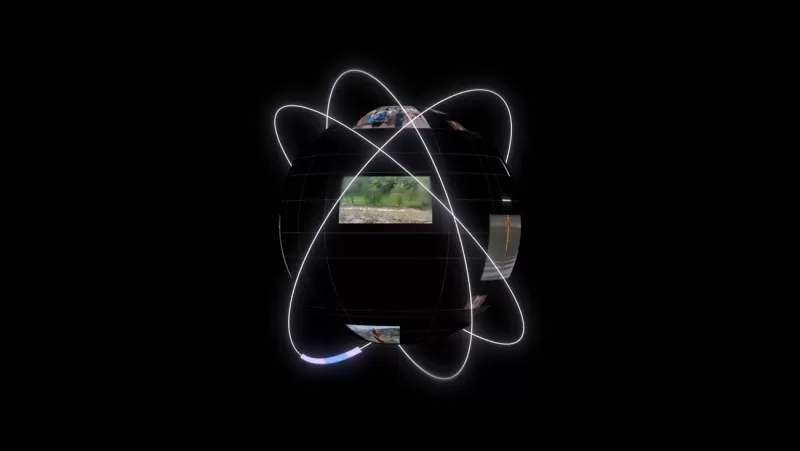AI Enhances Global Flood Forecasting Reliability

People rely on Google for reliable info during crises to safeguard themselves and their loved ones. Floods, being the most common natural disaster, affect nearly 1.5 billion people—about 19% of the world's population—who face significant risks from severe flooding. Not only do floods threaten lives, but they also cause around $50 billion in economic damages globally each year.
For most of history, predicting floods accurately on a large scale was tough due to the complexity of the issue and the lack of necessary resources and data. With only a tiny fraction of the world's rivers monitored by streamflow gauges, this posed a major safety challenge, especially for folks in developing countries and underserved communities.
In a new paper published in Nature, we explore how AI can revolutionize flood forecasting, reaching areas hardest hit by climate change. Our findings show that AI helped us predict riverine floods more accurately up to 7 days ahead. This enabled us to offer flood forecasts in 80 countries, covering 460 million people. We also make these forecasts available through Google Search, Google Maps, and Android notifications where possible.
Our research blog dives deeper into the paper, showcasing how Google Research's AI-based global hydrologic technologies can significantly enhance flood forecasting compared to current standards. This is especially important in countries with limited flood data, allowing us to expand forecasting worldwide. Early warning systems can drastically cut down fatalities, and extended lead times are a game-changer for communities. Our tech extended the reliability of global nowcasts from zero to five days on average, and we've improved forecasts in Africa and Asia to match those in Europe using AI.
This info is now a tool for people, communities, governments, and aid organizations to take preemptive action and protect vulnerable populations. It hasn't been an easy journey, particularly in areas with scarce data and high flood impacts. As we release our latest paper, let's reflect on some key moments in our quest to use AI for accurate riverine flood forecasting:
Our first pilot in India taught us a valuable lesson
Our journey started with a pilot in India's Patna region. Bihar, where Patna is situated, is one of India's most flood-prone states, with many residents facing the constant threat of devastating floods. We teamed up with local officials and used real-time data to develop flood forecasts, integrating them into Google Public Alerts in 2018.
We fed our models with a mix of historical events, river levels, and terrain data, running hundreds of thousands of simulations to create detailed river flood forecasts. While this method aimed at precision for specific locations, our ultimate goal was to tackle the global challenge. We believed machine learning could help scale flood forecasting worldwide.
Kicking off collaborations with the research and scientific community
In 2019, we expanded our flood forecasting coverage 12 times over, sending out 800,000 alerts to those in affected areas while improving our forecasting tech. As we delved deeper into machine learning's potential, we started working with academic researchers to blend hydrological physics-based flood simulations with our AI methods.
Our research and the progress with Long Short-Term Memory networks (LSTMs) for accurate flood predictions inspired us to envision a global, end-to-end flood forecasting platform. This platform would deliver reliable info, even in regions without flood gauges.
Flood forecasting further expanded, but was limited by local data availability
Building on our India pilot's success, we broadened our forecasts across India and into Bangladesh, reaching 360 million people. We managed forecasts up to 48 hours ahead thanks to our tech's advancements. However, our models depended on local streamflow data, which made scaling to other countries challenging.
The pivot to a global AI-based flood forecasting model and expansion to over 80 countries
Realizing the limitations of relying on local data, and with AI research advancing, we shifted to a global model. We used global data sources to train our LSTM networks, aiming to predict floods even in areas without local streamflow data.
In 2022, we launched the Flood Hub platform, offering forecasts in 20 countries—including 15 in Africa—where forecasting was previously limited by data scarcity. By 2023, we expanded to 60 more countries across Africa, the Asia-Pacific, Europe, and South and Central America, covering 460 million people. Now, real-time forecasts on the Flood Hub are freely accessible to many vulnerable communities in developing countries. Thanks to our global AI-based model, flood forecasting access in Africa is now on par with Europe.
Working in partnership
To keep pushing science and research forward and make a real difference where it's needed most, we know collaboration with academics, local governments, and international organizations is crucial.
We work with international aid groups to provide actionable flood forecasts and collaborate with the World Meteorological Organization (WMO) to support early warning systems, particularly the Early Warnings for All initiative, aiming to give everyone early warnings about climate hazards by 2027. We're also studying how AI can tackle real-world challenges faced by national flood forecasting agencies.
We've worked closely with academics and hydrological organizations through annual workshops and initiatives like our Caravan project, which standardizes and aggregates existing datasets.
Our journey is far from done
As climate change worsens, floods can hit unexpectedly. Our aim is to keep using our research and tech to expand our coverage, predict other flood-related events like flash and urban floods, and explore how AI can address broader climate adaptation challenges and sustainability issues.
Related article
 Midjourney Unveils Cutting-Edge AI Video Generator for Creative Content
Midjourney's AI Video Generation BreakthroughMidjourney has unveiled its inaugural AI video generation tool, marking a significant expansion beyond its renowned image creation capabilities. The initial release enables users to transform both uploaded
Midjourney Unveils Cutting-Edge AI Video Generator for Creative Content
Midjourney's AI Video Generation BreakthroughMidjourney has unveiled its inaugural AI video generation tool, marking a significant expansion beyond its renowned image creation capabilities. The initial release enables users to transform both uploaded
 Trump Prioritizes AI Growth Over Regulation in Race to Outpace China
The Trump administration unveiled its landmark AI Action Plan on Wednesday, marking a decisive break from the Biden administration's risk-averse AI policies. The ambitious blueprint prioritizes aggressive infrastructure development, sweeping regulato
Trump Prioritizes AI Growth Over Regulation in Race to Outpace China
The Trump administration unveiled its landmark AI Action Plan on Wednesday, marking a decisive break from the Biden administration's risk-averse AI policies. The ambitious blueprint prioritizes aggressive infrastructure development, sweeping regulato
 YouTube Integrates Veo 3 AI Video Tool Directly Into Shorts Platform
YouTube Shorts to Feature Veo 3 AI Video Model This SummerYouTube CEO Neal Mohan revealed during his Cannes Lions keynote that the platform's cutting-edge Veo 3 AI video generation technology will debut on YouTube Shorts later this summer. This follo
Comments (29)
0/200
YouTube Integrates Veo 3 AI Video Tool Directly Into Shorts Platform
YouTube Shorts to Feature Veo 3 AI Video Model This SummerYouTube CEO Neal Mohan revealed during his Cannes Lions keynote that the platform's cutting-edge Veo 3 AI video generation technology will debut on YouTube Shorts later this summer. This follo
Comments (29)
0/200
![RalphMitchell]() RalphMitchell
RalphMitchell
 September 23, 2025 at 2:30:42 PM EDT
September 23, 2025 at 2:30:42 PM EDT
Google這AI洪水預報技術真厲害!但資料準確性怎麼保證?如果誤報造成恐慌或漏報導致傷亡,責任歸屬會很模糊吧…畢竟人命關天,演算法失誤的代價太高了 😟


 0
0
![ScarlettWhite]() ScarlettWhite
ScarlettWhite
 August 15, 2025 at 7:00:59 AM EDT
August 15, 2025 at 7:00:59 AM EDT
This AI flood forecasting sounds like a game-changer! Saving lives with tech is the future. 🌍


 0
0
![JustinMartin]() JustinMartin
JustinMartin
 July 30, 2025 at 9:41:20 PM EDT
July 30, 2025 at 9:41:20 PM EDT
It's wild how AI is stepping up flood predictions! 🌊 Google’s tech helping 1.5 billion people stay safer is huge. Makes me wonder how else AI can tackle nature’s chaos. Excited for what’s next!


 0
0
![JackMitchell]() JackMitchell
JackMitchell
 July 22, 2025 at 3:35:51 AM EDT
July 22, 2025 at 3:35:51 AM EDT
This AI flood forecasting sounds like a game-changer! Knowing floods hit 1.5 billion people is wild—hope this tech saves lives. 🌊


 0
0
![LawrenceLee]() LawrenceLee
LawrenceLee
 April 25, 2025 at 2:28:33 PM EDT
April 25, 2025 at 2:28:33 PM EDT
AI Enhances Global Flood Forecasting is a lifesaver! It's super helpful during flood seasons, but sometimes the predictions are a bit off. Still, it's a must-have for anyone in flood-prone areas. Keep up the good work, and maybe improve the accuracy a bit? 🌊📈


 0
0
![MarkThomas]() MarkThomas
MarkThomas
 April 23, 2025 at 8:03:25 AM EDT
April 23, 2025 at 8:03:25 AM EDT
एआई एन्हांसेज ग्लोबल फ्लड फोरकास्टिंग जीवन रक्षक है! बाढ़ के मौसम में यह बहुत मददगार है, लेकिन कभी-कभी भविष्यवाणियाँ थोड़ी गलत होती हैं। फिर भी, बाढ़ प्रभावित क्षेत्रों में रहने वालों के लिए यह जरूरी है। अच्छा काम जारी रखें और शायद सटीकता में सुधार करें? 🌊📈


 0
0

People rely on Google for reliable info during crises to safeguard themselves and their loved ones. Floods, being the most common natural disaster, affect nearly 1.5 billion people—about 19% of the world's population—who face significant risks from severe flooding. Not only do floods threaten lives, but they also cause around $50 billion in economic damages globally each year.
For most of history, predicting floods accurately on a large scale was tough due to the complexity of the issue and the lack of necessary resources and data. With only a tiny fraction of the world's rivers monitored by streamflow gauges, this posed a major safety challenge, especially for folks in developing countries and underserved communities.
In a new paper published in Nature, we explore how AI can revolutionize flood forecasting, reaching areas hardest hit by climate change. Our findings show that AI helped us predict riverine floods more accurately up to 7 days ahead. This enabled us to offer flood forecasts in 80 countries, covering 460 million people. We also make these forecasts available through Google Search, Google Maps, and Android notifications where possible.
Our research blog dives deeper into the paper, showcasing how Google Research's AI-based global hydrologic technologies can significantly enhance flood forecasting compared to current standards. This is especially important in countries with limited flood data, allowing us to expand forecasting worldwide. Early warning systems can drastically cut down fatalities, and extended lead times are a game-changer for communities. Our tech extended the reliability of global nowcasts from zero to five days on average, and we've improved forecasts in Africa and Asia to match those in Europe using AI.
This info is now a tool for people, communities, governments, and aid organizations to take preemptive action and protect vulnerable populations. It hasn't been an easy journey, particularly in areas with scarce data and high flood impacts. As we release our latest paper, let's reflect on some key moments in our quest to use AI for accurate riverine flood forecasting:
Our first pilot in India taught us a valuable lesson
Our journey started with a pilot in India's Patna region. Bihar, where Patna is situated, is one of India's most flood-prone states, with many residents facing the constant threat of devastating floods. We teamed up with local officials and used real-time data to develop flood forecasts, integrating them into Google Public Alerts in 2018.
We fed our models with a mix of historical events, river levels, and terrain data, running hundreds of thousands of simulations to create detailed river flood forecasts. While this method aimed at precision for specific locations, our ultimate goal was to tackle the global challenge. We believed machine learning could help scale flood forecasting worldwide.
Kicking off collaborations with the research and scientific community
In 2019, we expanded our flood forecasting coverage 12 times over, sending out 800,000 alerts to those in affected areas while improving our forecasting tech. As we delved deeper into machine learning's potential, we started working with academic researchers to blend hydrological physics-based flood simulations with our AI methods.
Our research and the progress with Long Short-Term Memory networks (LSTMs) for accurate flood predictions inspired us to envision a global, end-to-end flood forecasting platform. This platform would deliver reliable info, even in regions without flood gauges.
Flood forecasting further expanded, but was limited by local data availability
Building on our India pilot's success, we broadened our forecasts across India and into Bangladesh, reaching 360 million people. We managed forecasts up to 48 hours ahead thanks to our tech's advancements. However, our models depended on local streamflow data, which made scaling to other countries challenging.
The pivot to a global AI-based flood forecasting model and expansion to over 80 countries
Realizing the limitations of relying on local data, and with AI research advancing, we shifted to a global model. We used global data sources to train our LSTM networks, aiming to predict floods even in areas without local streamflow data.
In 2022, we launched the Flood Hub platform, offering forecasts in 20 countries—including 15 in Africa—where forecasting was previously limited by data scarcity. By 2023, we expanded to 60 more countries across Africa, the Asia-Pacific, Europe, and South and Central America, covering 460 million people. Now, real-time forecasts on the Flood Hub are freely accessible to many vulnerable communities in developing countries. Thanks to our global AI-based model, flood forecasting access in Africa is now on par with Europe.
Working in partnership
To keep pushing science and research forward and make a real difference where it's needed most, we know collaboration with academics, local governments, and international organizations is crucial.
We work with international aid groups to provide actionable flood forecasts and collaborate with the World Meteorological Organization (WMO) to support early warning systems, particularly the Early Warnings for All initiative, aiming to give everyone early warnings about climate hazards by 2027. We're also studying how AI can tackle real-world challenges faced by national flood forecasting agencies.
We've worked closely with academics and hydrological organizations through annual workshops and initiatives like our Caravan project, which standardizes and aggregates existing datasets.
Our journey is far from done
As climate change worsens, floods can hit unexpectedly. Our aim is to keep using our research and tech to expand our coverage, predict other flood-related events like flash and urban floods, and explore how AI can address broader climate adaptation challenges and sustainability issues.
 Midjourney Unveils Cutting-Edge AI Video Generator for Creative Content
Midjourney's AI Video Generation BreakthroughMidjourney has unveiled its inaugural AI video generation tool, marking a significant expansion beyond its renowned image creation capabilities. The initial release enables users to transform both uploaded
Midjourney Unveils Cutting-Edge AI Video Generator for Creative Content
Midjourney's AI Video Generation BreakthroughMidjourney has unveiled its inaugural AI video generation tool, marking a significant expansion beyond its renowned image creation capabilities. The initial release enables users to transform both uploaded
 Trump Prioritizes AI Growth Over Regulation in Race to Outpace China
The Trump administration unveiled its landmark AI Action Plan on Wednesday, marking a decisive break from the Biden administration's risk-averse AI policies. The ambitious blueprint prioritizes aggressive infrastructure development, sweeping regulato
Trump Prioritizes AI Growth Over Regulation in Race to Outpace China
The Trump administration unveiled its landmark AI Action Plan on Wednesday, marking a decisive break from the Biden administration's risk-averse AI policies. The ambitious blueprint prioritizes aggressive infrastructure development, sweeping regulato
 YouTube Integrates Veo 3 AI Video Tool Directly Into Shorts Platform
YouTube Shorts to Feature Veo 3 AI Video Model This SummerYouTube CEO Neal Mohan revealed during his Cannes Lions keynote that the platform's cutting-edge Veo 3 AI video generation technology will debut on YouTube Shorts later this summer. This follo
YouTube Integrates Veo 3 AI Video Tool Directly Into Shorts Platform
YouTube Shorts to Feature Veo 3 AI Video Model This SummerYouTube CEO Neal Mohan revealed during his Cannes Lions keynote that the platform's cutting-edge Veo 3 AI video generation technology will debut on YouTube Shorts later this summer. This follo
 September 23, 2025 at 2:30:42 PM EDT
September 23, 2025 at 2:30:42 PM EDT
Google這AI洪水預報技術真厲害!但資料準確性怎麼保證?如果誤報造成恐慌或漏報導致傷亡,責任歸屬會很模糊吧…畢竟人命關天,演算法失誤的代價太高了 😟


 0
0
 August 15, 2025 at 7:00:59 AM EDT
August 15, 2025 at 7:00:59 AM EDT
This AI flood forecasting sounds like a game-changer! Saving lives with tech is the future. 🌍


 0
0
 July 30, 2025 at 9:41:20 PM EDT
July 30, 2025 at 9:41:20 PM EDT
It's wild how AI is stepping up flood predictions! 🌊 Google’s tech helping 1.5 billion people stay safer is huge. Makes me wonder how else AI can tackle nature’s chaos. Excited for what’s next!


 0
0
 July 22, 2025 at 3:35:51 AM EDT
July 22, 2025 at 3:35:51 AM EDT
This AI flood forecasting sounds like a game-changer! Knowing floods hit 1.5 billion people is wild—hope this tech saves lives. 🌊


 0
0
 April 25, 2025 at 2:28:33 PM EDT
April 25, 2025 at 2:28:33 PM EDT
AI Enhances Global Flood Forecasting is a lifesaver! It's super helpful during flood seasons, but sometimes the predictions are a bit off. Still, it's a must-have for anyone in flood-prone areas. Keep up the good work, and maybe improve the accuracy a bit? 🌊📈


 0
0
 April 23, 2025 at 8:03:25 AM EDT
April 23, 2025 at 8:03:25 AM EDT
एआई एन्हांसेज ग्लोबल फ्लड फोरकास्टिंग जीवन रक्षक है! बाढ़ के मौसम में यह बहुत मददगार है, लेकिन कभी-कभी भविष्यवाणियाँ थोड़ी गलत होती हैं। फिर भी, बाढ़ प्रभावित क्षेत्रों में रहने वालों के लिए यह जरूरी है। अच्छा काम जारी रखें और शायद सटीकता में सुधार करें? 🌊📈


 0
0





























